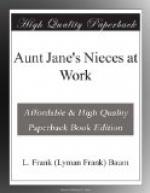Doubtless no one will ever know how much good these two kindly men accomplished between them in their quiet, secretive way. Dozens of deserving young men were furnished capital to start them in business; dozens more were being educated at universities at Uncle John’s expense. Managers of worthy charities were familiar with John Merrick’s signature on checks, and yet the vast fortune grew with leaps and bounds. Mr. Merrick’s life was so simple and unostentatious that his personal expenses, however erratic some of his actions, could not make much headway against his interest account, and nothing delighted him more than to find a way to “get even with fate by reckless squandering,” as he quaintly expressed it. He was far too shrewd to become the prey of designing people, but welcomed any legitimate channel in which to unload his surplus.
So Mr. Merrick had been revolving the possibilities of this unique political campaign in his mind, and had decided to do some things that would open the bucolic eyes of Kenneth’s constituents in wonder. He did not confide all his schemes to Patsy, but having urged his nieces to attempt this conquest he had no intention of allowing them to suffer defeat if he could help it.
The little town of Elmwood was quiet and practically deserted when they drove into it. The farmers were too busy with the harvest to “come to town for trading” except on Saturdays, and the arrival and departure of the two daily trains did not cause more than a ripple of excitement in the village.
Patsy decided she would shop at each and every store in the place, and engage the store-keepers in conversation about the election.
“It’s important to win these people,” she declared, “because they are close to every farmer who comes to town to trade; and their own votes count, too.”
“I’ll run over to the bank,” said Uncle John, “and get acquainted there.”
So he tied the horses to a post and let Patsy proceed alone upon her mission, while he wandered over to a little brick building of neat appearance which bore the inscription “Bank” in gold letters on its plate-glass window.
“Mr. Warren in?” he asked the clerk at the window.
The banker, a dignified old gentleman of considerable ability, came out of his private office and greeted his visitor very cordially. He had known Uncle John when the millionaire visited Elmhurst two years before, and since then had learned more particulars concerning him. So there was no need of an introduction, and Mr. Warren was delighted at the prospect of business relations with this famous personage.
The bank, although small and only one story high, was the most modern and imposing building in the village; and it was fitted with modern conveniences, for Mr. Warren had been successful and prosperous. In his private office were local and long distance telephones, a direct connection with the telegraph operator at the station, and other facilities for accomplishing business promptly. Uncle John had remembered this fact, and it had a prominent place in his plans.




